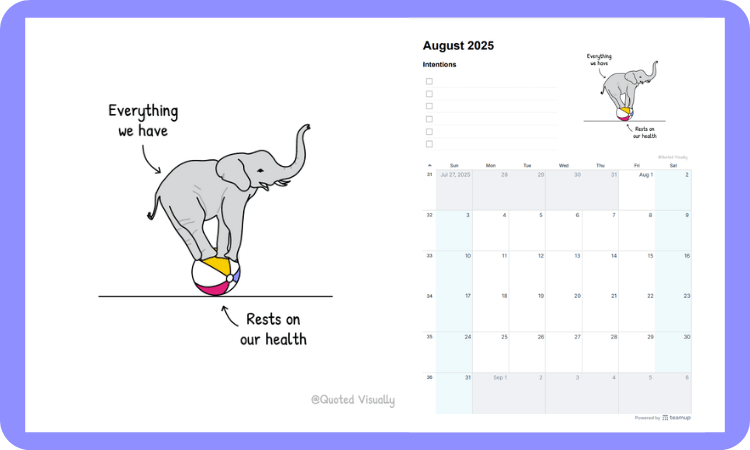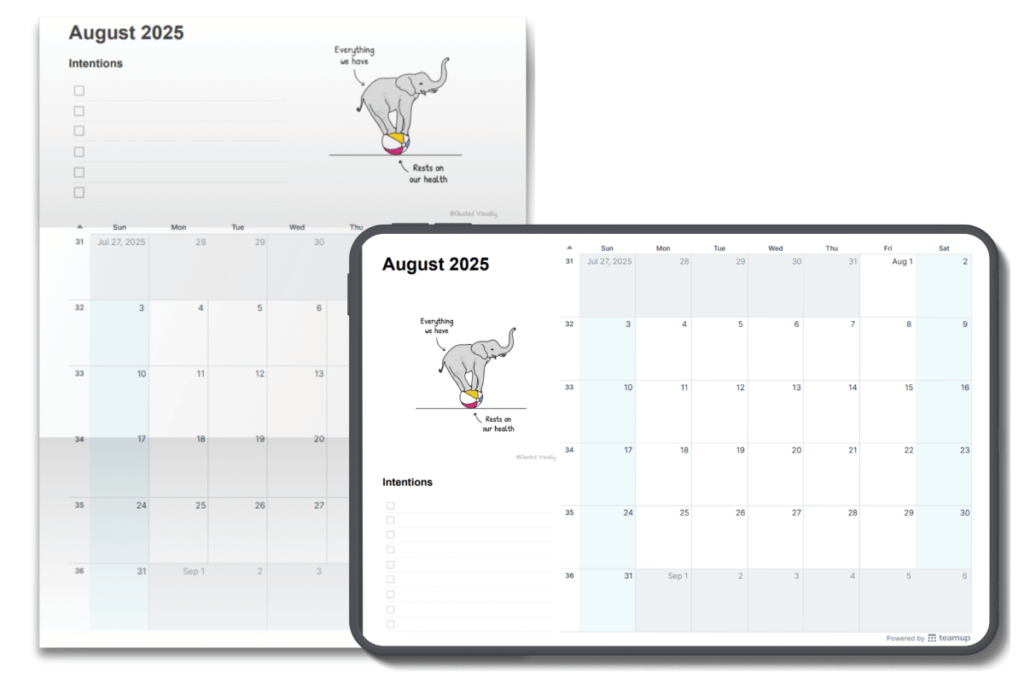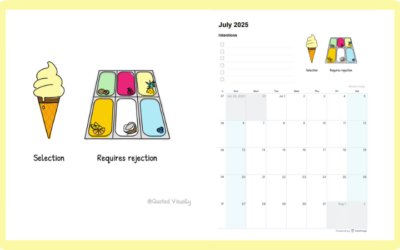Everything we have rests on our health. Putting our own well-being first can be surprisingly difficult. But it’s key for, well, everything! Remind yourself with our August illustrated calendar, available to download and print in portrait or landscape. See our complete collection of 2025 printable calendars for even more options.
Taking care of your health is more than a nice idea. It’s a necessity. How you nurture your well-being affects everything else in your life. So, no matter where you are on the wellness spectrum, your health should always be top priority.
Taking care of your health might mean learning how manage chronic conditions. It might mean updating your lifestyle to stay balanced in new situations. It might mean adapting to unseen health challenges or lifestyle limitations. Or it might be learning not to take good health for granted. Building proactive habits can help. But first, we need to take down the obstacles that stop us from putting these habits in place.
Why prioritizing health is difficult
We know health should come first, but making it a priority gets tricky.
Common obstacles
- Time constraints: With work, family, errands, and more, self-care often gets pushed to the bottom of the list. It feels like there’s just no time.
- Emotional barriers: Stress, burnout, and guilt can make self-care feel like a luxury. You might think you can’t afford to take time for yourself.
- Lack of awareness: Sometimes, we downplay symptoms until they become unmanageable. Or we assume “things are fine” without really checking in on our daily energy, ease, and overall wellness.
- Financial barriers: Healthcare costs, gym memberships, healthy food: it adds up. When money is tight, investing in health can feel out of reach.
- Chronic conditions: Managing long-term health issues is a full-time job. It’s easy to feel overwhelmed, discouraged, or like you’re stuck in a never-ending cycle.
- Hustle culture: Obsession with work and productivity can make health feel unimportant. Resting and self-care often feel like guilty pleasures instead of essentials.
- Aesthetic focus: Focusing on appearance can cause unhealthy habits if we prioritize looks over how we feel or function.
Getting past obstacles
Everyone faces different challenges. Understanding your personal roadblocks can show you where to make changes. And don’t worry: You’re not trying to make huge shifts or completely demolish every obstacle you face. Instead, you want to focus on small but meaningful changes that help you get past the barriers in your way.
For example, if money is a concern, you don’t need a gym membership to stay active. Simple outdoor exercises like walking, running, or bodyweight workouts work well too. If time is your issue, focus on short activities (like a 10-minute stretch or short lunchtime walk) and making a few healthier substitutions instead of overhauling your daily routine. If you feel guilty about resting because the cult of hustle got in your head, try some guided meditations or CBT techniques to reframe how you think about rest and self-care.
Proactive habits to prioritize health
“In order to design successful habits and change your behaviors, you should do three things. Stop judging yourself. Take your aspirations and break them down into tiny behaviors. Embrace mistakes as discoveries and use them to move forward.”
— B.J. Fogg, Tiny Habits
To build proactive habits that help you prioritize health, focus on small, consistent steps. Look for opportunities and simple changes that already fit your lifestyle. And think about how you can use the routines you already have: Upgrading old habits can be an easy but powerful approach.
- Start small: Small is good. Small is doable. Small is sustainable. Don’t stress over big plans. Focus on tiny changes or additions, like taking a 10-minute walk or drinking more water.
- Focus on consistency: Habits are built by consistence, not effort. In fact, the best habits seem to require zero effort; they become automatic. Aim for consistent action at a tiny scale.
- Scale up: Once you’re able to consistently take a tiny step, make it a little bigger. Don’t go for big leaps. Go for incremental upgrades.
- Set realistic goals: Aim for progress and celebrate small wins. Consistency doesn’t need to be flawless to be effective.
- Prioritize self-awareness: Regularly check in with yourself. How does your body feel? How’s your mind? What do you need right now?
- Build support: Habits are easier when we have a little accountability and feel part of a group. Check into online forums and groups; talk to local friends who want to join in.
- Schedule what matters: Put it on your calendar and treat it like you would any scheduled event: Quiet time, exercise block, food prep, offline hours.
- Be kind to yourself: Setbacks happen. Give yourself grace and keep moving forward.
Making health a priority means more than avoiding illness. It’s about honoring your body and mind every day. And a big part of that is learning how to let go of self-judgment and pay attention to what works best for you. Some days you may need to push yourself a little more. Some days you need to give yourself more rest. Have an attitude of curiosity: What’s helpful? Why? What might work better? What can I try? As you build small habits and pay attention to the effects, you’ll learn more about what truly brings you more well-being.




